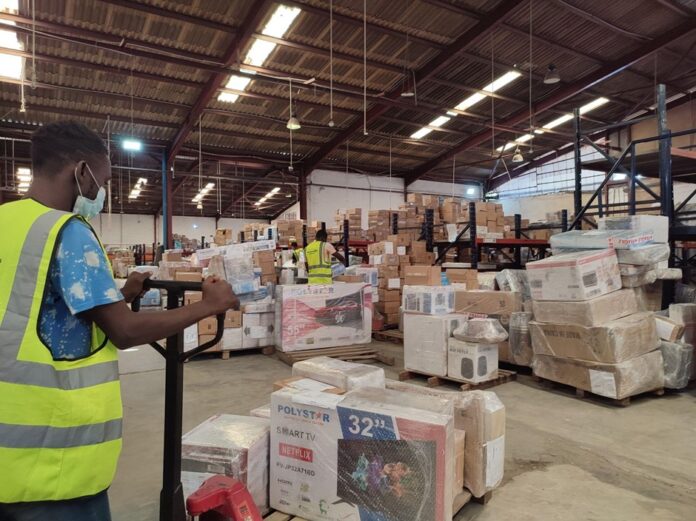…Starting a business is no easy feat
Jumia, the number one online shopping site in Nigeria has made profitable market opportunities to increase the rate of SME creation.
This increases the total number of SMEs in the country, which increases job creation and income per capita. The contributions of SMEs to employment and the country’s gross domestic product (GDP) are by no means trivial.
Over the years, Nigeria’s leading e-commerce platform, Jumia, has helped several vendors get online, reduce and, in most cases, eliminate some of the costs associated with running their business.
The platform has connected over 10,000 SMEs and business owners to millions of consumers in Nigeria. Before the advent of Jumia, vendors relied on multiple stores and shops across the country to scale their businesses and increase their reach. Today, vendors can sell their products to consumers anywhere in the country and have them delivered conveniently. Asides from this, vendors can also save on operating expenses such as staff salaries since online sales require fewer hands to run.
There is a lot of research, planning, and capital that goes into it. It often feels like there are 1,000 things to do at the same time. New small business owners are often faced with this reality, but, over the years, Nigeria’s leading e-commerce platform, Jumia, has helped several vendors get online, reduce and, in most cases, eliminate some of the costs associated with running their business.
The platform has connected over 10,000 SMEs and business owners to millions of consumers in Nigeria. Before the advent of Jumia, vendors relied on multiple stores and shops across the country to scale their businesses and increase their reach. Today, vendors can sell their products to consumers anywhere in the country and have them delivered conveniently. Asides from this, vendors can also save on operating expenses such as staff salaries since online sales require fewer hands to run.
Small and Medium-Scale Enterprises represent about 90 per cent of businesses and more than 50 per cent of employment worldwide. According to the World Bank, formal SMEs contribute up to 40 per cent of national income (Gross Domestic Product) in developing countries.
It is certainly no exaggeration that SMEs play a major role in most economies, particularly in the context of developing regions. If you look around, chances are high that you can mention 10 SME owners without thinking too much about it. This comes as no shock since unemployment is a hard nut to crack in many African countries. Even so, the SME sector continues to accommodate many youths who struggle to turn their side hustles into actual businesses.

The visibility Jumia provides sellers on its platform is the major prerequisite most businesses today need to grow and prosper. Vendors have benefited from Jumia because they now have more revenue to invest in their businesses. The platform has also helped vendors market their products to specific target markets, thereby saving vendors marketing costs while increasing their customer base.
Onyinye, Tunde, and Bukola, who are long-time beneficiaries, prove that Jumia stands for the advancement of SMEs as they share their experiences as business owners selling on Jumia. For Onyinye Ejide, it has been a story of tremendous growth with Jumia, as the platform has helped expand his variety of merchandise. From selling just two phone brands in 2012 to several electronic devices thanks to accessing easy and reliable online sales on the platform. In addition, the platform also ensures that every vendor can increase sales and profit. Tunde Olaniyan of Danami Fashion House verified this when he spoke with Jumia about how over 80% of the sales from his business come from Jumia.
According to Tunde, “As a fashion house, we make different kinds of clothes for men and women. We started six years ago, and today we are bigger and better with 80% of our sales coming from Jumia”.
As a business owner, wife, and mother, CEO of Purple Linings Ventures, Bukola Ogundijo has been able to balance out her responsibilities and conveniently sell her products thanks to Jumia. She has been selling home appliances and fashion items on Jumia since 2014, which has helped her provide more for her family.
“I can sell to people in Kaduna, Abuja, and Portharcourt, and this has really increased my sales. Jumia has been very helpful in managing my business because I don’t need to worry about warehousing or delivery. From my living room with my smartphone in hand, I can attend to customers while taking care of my family”, she said.
Delivery of goods can also be one of the many headaches of running a business, but Jumia helps solve this with its fast and reliable logistics network, giving vendors one less thing to worry about.
The testimonies from Onyinye, Tunde, and Bukola prove Jumia’s influence on SMEs over the past decade in Nigeria and further strengthen the notion that E-commerce presents opportunities for small businesses in Nigeria to grow and reach new heights.






